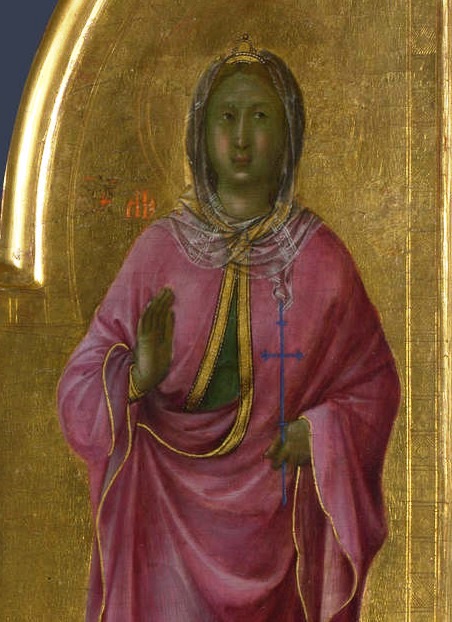 Today is the feast of St. Aurea (in Greek Chryse, “Golden Girl”) of Ostia. She is an ancient martyr. You can read about here in these ancient Acta, HERE.
Today is the feast of St. Aurea (in Greek Chryse, “Golden Girl”) of Ostia. She is an ancient martyr. You can read about here in these ancient Acta, HERE.
There is on the edge of Ostia Antica, the fascinating ruins of Rome’s ancient seaport, a little church dedicated to St. Aurea. It has been of special interest to me because St. Monnica, the mother of St. Augustine of Hippo, was for a time interred there.
You remember the story of Monnica dying in Ostia. Augustine and his family were travelling back to North Africa after his baptism in Milan. There was civil unrest at the time and Ostia was blockaded. While they were waiting, Monnica became ill and died. She famously told her son, (conf. 9):
“Ponite, inquit hoc corpus ubicumque: nihil vos eius cura conturbet; tantum illud vos rogo, ut ad Domini altare memineritis mei, ubiubi fueritis…. Lay this body anywhere, she said: let the care for it trouble you not at all; I ask only this, that you will remember me at the Lord’s altar, whersoever you may be.”
She was buried there in Ostia. In the 6th century she was moved to the little church of St. Aurea. In 1430 her remains were translated by Pope Martin V to the Roman Basilica of St. Augustine near the Piazza Navona.
If you are in Rome and you have some time, a trip out to the ruins of Ostia Antica is worth while, especially if you don’t have time or energy to go all the way to Pompeii.
Also, for you who are in London, go to the Sainsbury wing of the National Gallery and find the beautiful Virgin and Child with Sts. Dominic and Aurea by one of my favorites among the Sienese painters, Duccio di Buoninsegna.
So, perhaps today you might ask for St. Golden Girl’s intercession for something you need help with or for someone else who has a burden.



































I can’t be in London sadly, however I did see that the London Oratory are drawing attention to a painting of The Visitation by Federico Barocci at the same exhibition. St Philip loved this painting:
http://www.bromptonoratory.com/Barocci.jpg
“(St Philip’s) biographer relates the following: “[Philip] was in the chapel of the Visitation, one of his favourite haunts, because he was particularly fond of Barocci’s picture which is there; and sitting down, according to his custom, upon a little seat, he passed unawares into a most sweet ecstasy.”
http://www.bromptonoratory.com/Barocci.html
Thank you for this, and not least for the Acta link!
“Iussit eam fustibus caedi sub voce praeconia dicens: ‘Sacrilega Aura noli blasphemare deos, et regnum gubernatores.’ ” And “”Tua infelicitas haec meretur”. Contrasting with which, “Respondit Maximus presbyter et dixit: ‘Non nos seducimus homines: sed quantum gratia Dei donat per ipsum nostrum Iesum Christum liberamus de errore saeculi’ “. Plus ca change…
The official government insistence that the evil Christians must “desire to be contaminated with magic” at a time when Iamblichus was freely promoting theurgy and prayer and offerings to ‘daimones’ as good things, is striking!
The time given there for St. Aurea’s martyrdom is about a decade after that which Newman so vividly imagines in his historical novel, Callista (available online at the Newman Reader).
Fascinating. St. Aurea, pray for us.
As for another ancient golden girl, albeit a secular one, tomorrow is the birthday of Aurelia Cotta (120 BC), mother of Julius Caesar and grandmother of Octavian [who became Augustus Caesar].
Venerator Sti Lot says: And Callista is available on Kindle FOR FREE.
Ahh…. so that is why gold’s elemental initials are Au….
A prayer to St. Golden Girl might also include a nod to Sts. Dorothy, Blanche, Rose, and Sophia.
You can include ‘gratias agimus tibi propter amicitiam tuam’ in its sung English translation.
Venerator Sti Lot, and Fr. Z, and Andkaras all highly recommend the early novel “Callista” by Newman. My library sent out to a major University for an actual book copy from the late 1800s for me. It was practically falling apart in my hands ( Goosebumps !), and you can get it for Free.